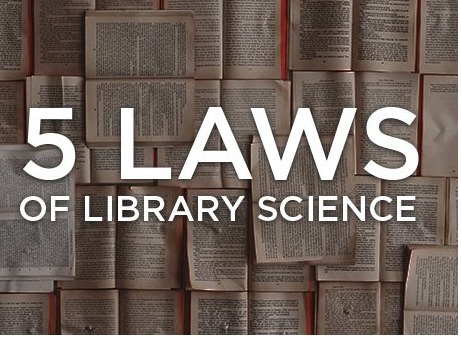Five Laws of Library Science ... detailing the Principles of operating a Library System


(Source: Alchetron, under CC BY-SA)
The Five laws of Library Science is a theory proposed by S. R. Ranganathan in 1931, detailing the principles of operating a Library System.
Five laws of Library Science are called the set of norms, percepts, and guides to good practice in librarianship. Dr. S.R. Ranganathan conceived the Five Laws of Library Science in 1924. The statements embodying these laws were formulated in 1928. |
These laws of Library Science are:
- The "fundamental laws" of Library Science;
- Applicable to any problem in the areas of library science, library service, and library practice;
- Like pot containing oceans. Prior to their enunciation, the subject of Library Science had no philosophy;
- Guaranteeing an everlasting future to the subject of Library Science, the profession of librarianship, and the use of libraries;
- Providing a scientific approach to the subject of Library Science.
"Do the Original 5 Laws of Library Science Hold Up in a Digital World?" Here they are:
LAWS | IMPLICATIONS of LAWS |
*FIRST LAW: Books Are For Use* |
|
| 1. Open Access |
| 2. Location |
| 3. Library Hours |
| 4. Library Building and Furniture |
| 5. Book Selection Policy |
| 6. Library Techniques |
| 7. Publicity |
| 8. Library Staff |
| |
*SECOND LAW: Every Reader His/Her Book* |
|
| 1. Obligations of the State |
| 2. Obligation of the Library Authority |
| 3. Obligation of Library Staff |
| 4. Obligation of the Reader |
*THIRD LAW: Every Book Its Reader* |
|
| 1. Open Access |
| 2. Book Selection |
| 3. Shelf Arrangement |
| 4. Easy Accessibility |
| 5. Cataloging |
| 6. Reference Service |
| 7. Publicity |
| 8. Extension Service |
*FOURTH LAW: Save The Time Of The Reader* |
|
| 1. Open Access |
| 2. Location |
| 3. Shelf Arrangement, Classification, and Cataloging |
| 4. Stack-Room Guides |
| 5. Issue and Return |
| 6. Reference Service |
| 7. Documentation Service |
| 8. Library Staff |
*FIFTH LAW: The Library Is A Growing Organism* |
|
| 1. Balanced Growth |
| 2. Casting Off the Old (Obsolete) and Preserving Valuable Books |
| 3. Choice of a Classification Scheme |
| 4. Choice of a Catalog Code |
| 5. Modernization |
| 6. Staff |
| 7. Library Building - Provision for Future |
| 8. Safeguards |
Read full multimedia article from source: Librarian Studies & Information Technology : *Five Laws of Library Science*.
Related: Why Books Will Always Matter (The Scholarly Kitchen)

